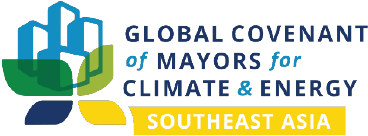29 October 2021 | The Secretariat of the GCoM SEA hosted “Bilateral Meeting for GCoM Asia Project Implementation in Indonesia” on Friday, 29 October 2021. The meeting was attended by representatives of the Ministry of Environment and Forestry of Indonesia (MoEF), the Association of Indonesian Municipalities (AIM/APEKSI), GCoM Asia Project’s Technical Partner–the Center for Climate Risk and Opportunity Management in Southeast Asia and the Pacific of IPB University (CCROM-SEAP IPB), the EUD and UCLG ASPAC as the host of GCoM SEA Secretariat.
Continuing the successful implementation of the GCoM Phase I (International Urban Cooperation or IUC Project) in Indonesia, this meeting aims to regain support from the MoEF of Indonesia, AIM/APEKSI, and others for the GCoM Phase II implementation under the GCoM Asia Project.
In the opening remarks, Seth van Doorn, Representative of the European Union Delegation (EUD) to Indonesia, highlighted that the Foreign Policy Instrument carries out international cooperation on behalf of the EU in fields of shared interests between the EU and the countries it is working with, including urban climate change.
Following this, the Secretary-General of UCLG ASPAC and the GCoM SEA Secretariat, Dr. Bernadia Irawati Tjandradewi, addressed how city leaders are taking active participation to tackle climate change in the global covenant and hoped for better commitments in Asia and the Pacific. “There are more than 10,000 cities in the world committed to the GCoM, and 800 of them have targets for climate mitigation and adaptation. From this, we know that the commitment from local governments is there, but the number of committed LGs in the Asia-Pacific region needs to be increased.”
In addition, the Executive Director of APEKSI Alwis Rustam echoed the important role of local governments prioritising climate action in their development planning. “This project goes beyond capacity building; it is aimed at the decision-makers. Thus, it is crucial to ensure this project is included in the development plan and budget of the local governments,” he said. APEKSI has been involved in the pilot city selection of the GCoM SEA by providing inputs on the criteria and establishing a Climate Change Working Group consisting of 18 cities with a high interest in climate actions.
Implementing GCoM Asia Project in Indonesia
During the meeting, the Team Leader of the GCoM Asia Project, Asih Budiati, shared the plan for GCoM Asia Project 2021-2023 with the meeting participants. The Executive Director of CCROM-SEAP IPB, Dr. Rizaldi Boer presented the technical approach to the project for Climate Action Plans (CAPs) development and mitigation and adaptation training programmes.
The meeting proceeded with a discussion on the selection of four pilot cities to prepare their local CAPs. There will also be 20 proposed cities that will receive training on mitigation and adaptation.
Representing Novia Widyaningtyas, Secretary of the Directorate General of Climate Change Control of the MoEF, Head of Program and Evaluation Division Budi Wirawan showed his full support to the GCoM Asia Project. Responding to the concern on regulation, Mr. Budi said that an enabling environment for climate action at the local level should be encouraged through regulations. For example, the Decree of the Minister of Home Affairs No. 050/3708/2020 has made it eligible for local governments to include activities on climate adaptation and mitigation in their local planning budget. To ensure the sustainability of the project, the MoEF will be in touch with the Ministry of Home Affairs (MoHA) of Indonesia.
To conclude, strong city leadership and commitment are the keys to the project’s ambitious targets of more GCoM signatories and their improved capacity for climate actions for Indonesian cities and local governments. With the positive response from all stakeholders involved, the meeting ended on an optimistic note, which is a green light for the implementation of the GCoM Asia Project.
—
A bilateral Meeting in each targeted country is a meeting organised by the GCoM SEA Secretariat to ensure vertical and horizontal integration during the GCoM Asia Project implementation period. This meeting is attended by representatives of the ministry of environment, the association of local governments, and technical partners. The first bilateral meeting was conducted in Vietnam.
—
Written and reviewed by: Rona Ikram Putri












